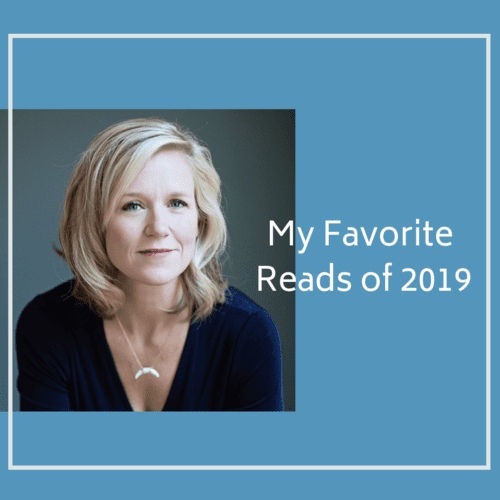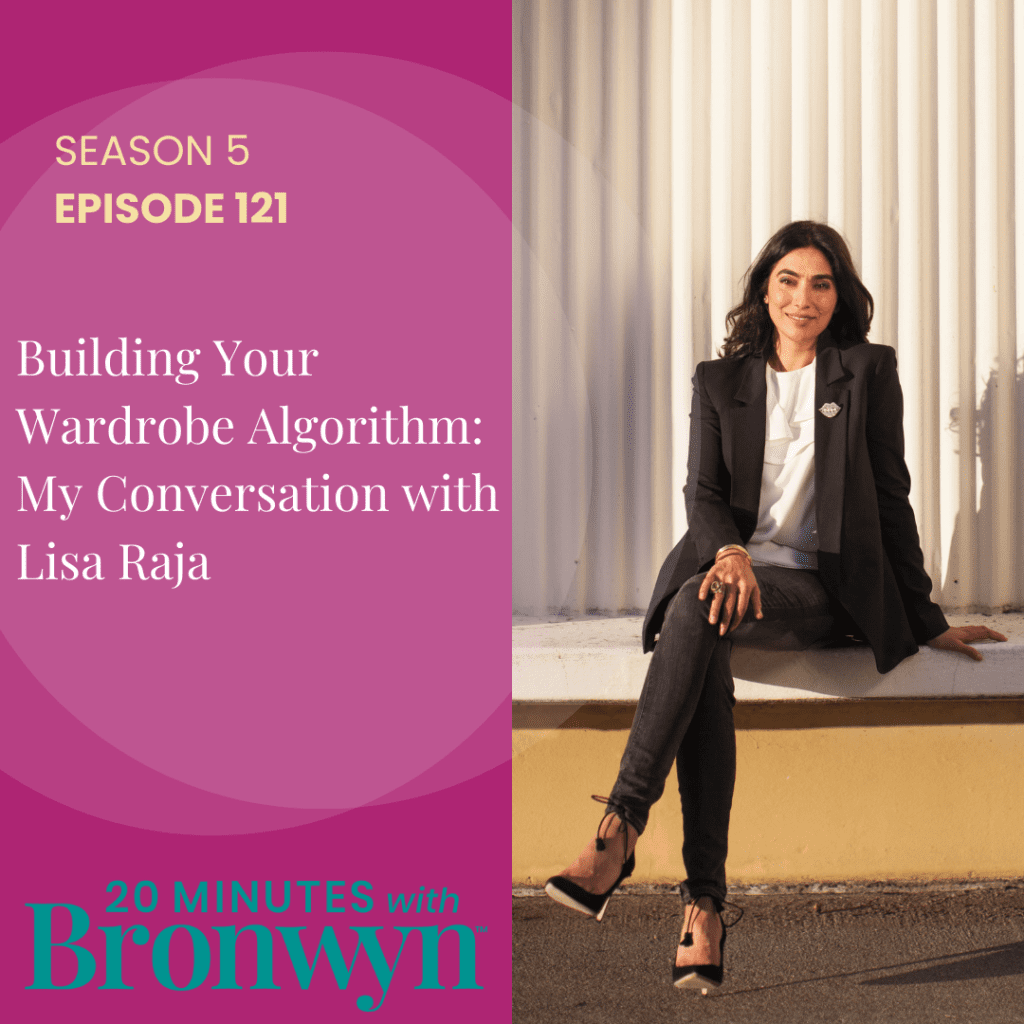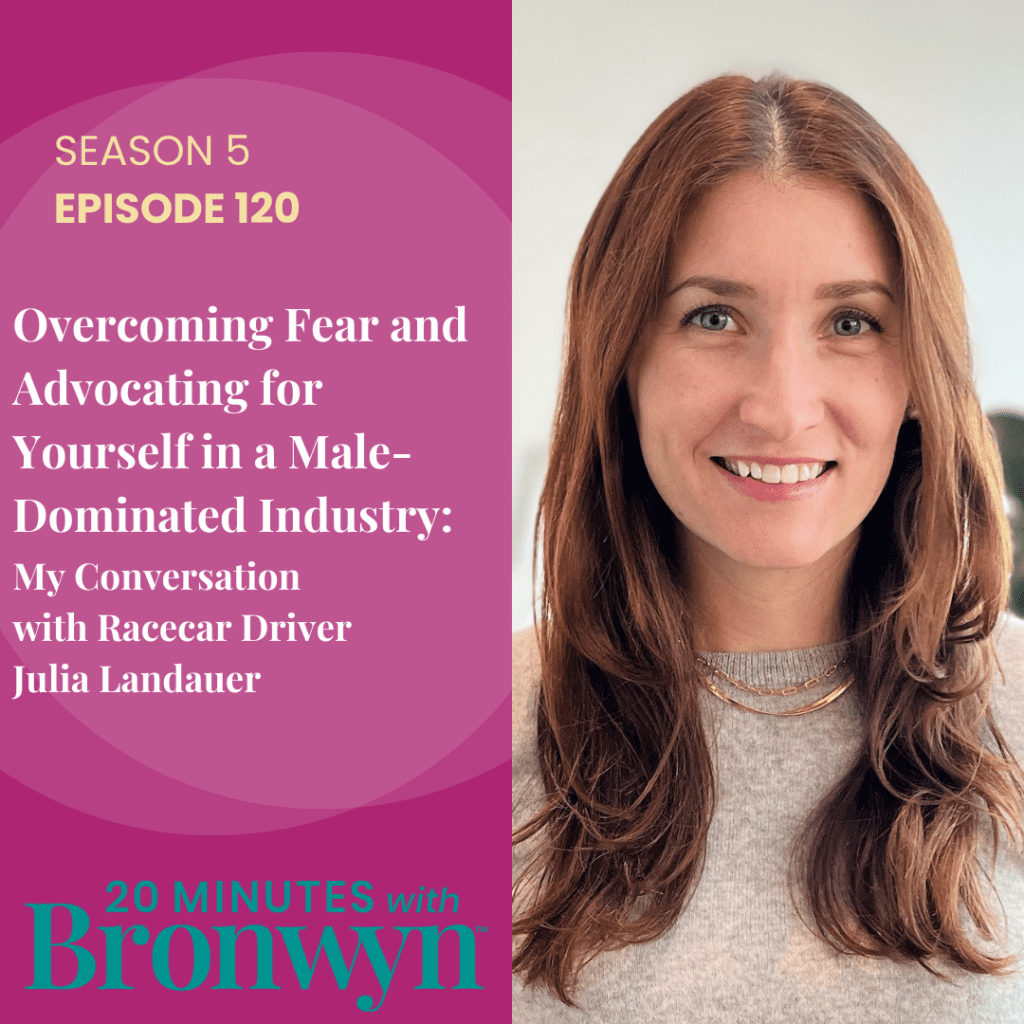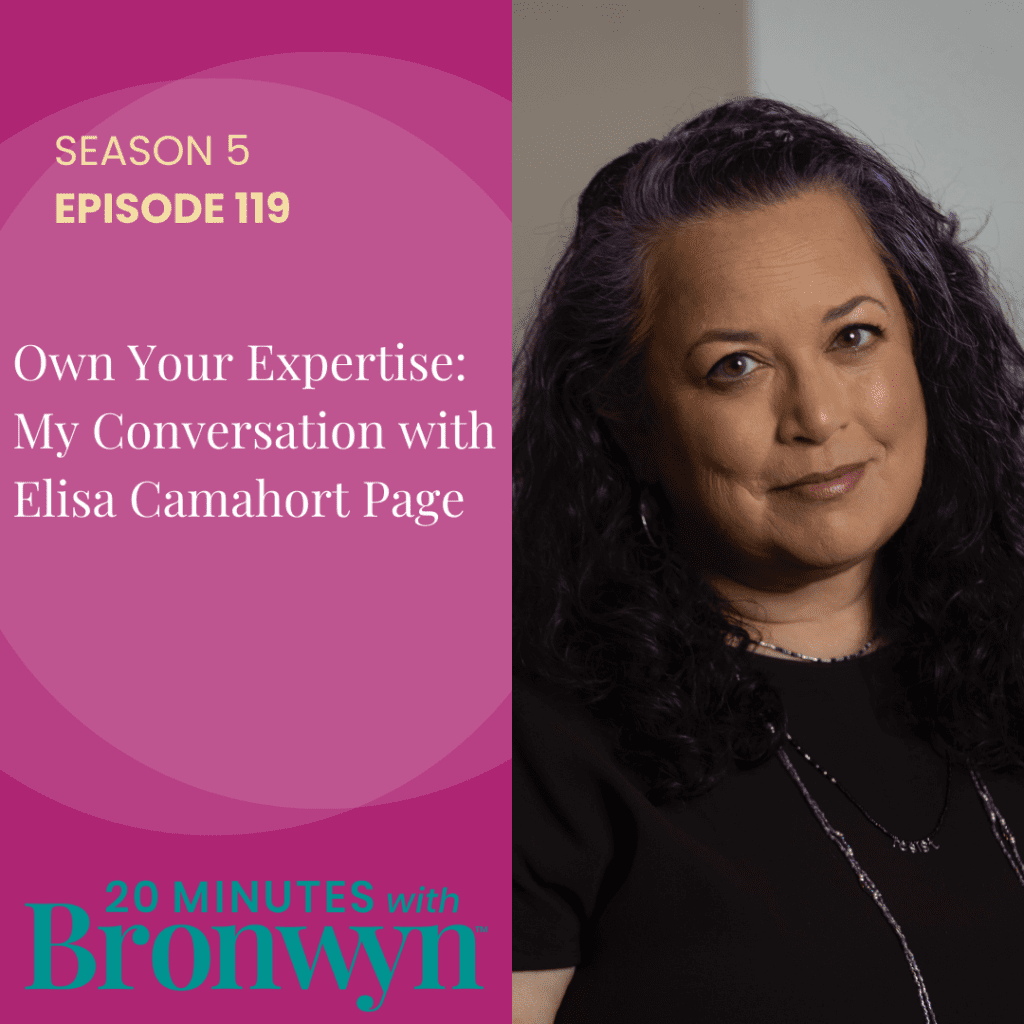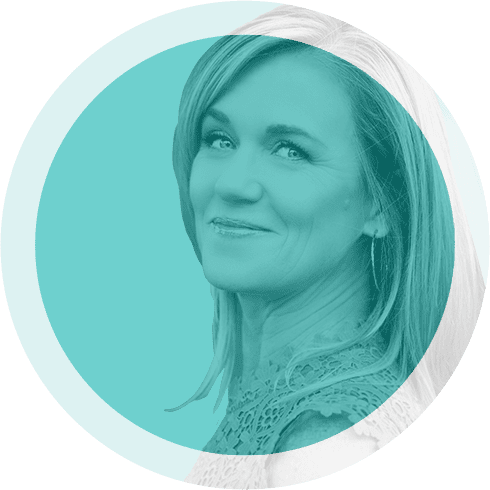I read some GREAT books this year.
And given that we are closing out a decade, I figured I’d go big this time.
I’ve got 10 non-fiction and 10 fiction recommendations for you as we move into 2020. They are in no particular order, because that would be like telling you which of my children I prefer. They were all that good.
Take a gander, and let me know what’s missing, what’s a HELL YEAH, and where you disagree with my choices. I love all feedback. 😉
Fiction
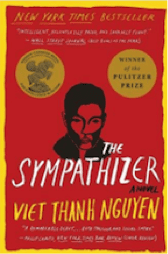
The Sympathizer
Viet Thanh Nguyen
“You know how Americans deal with it? They pretend they are eternally innocent no matter how many times they lose their innocence. The problem is that those who insist on their innocence believe anything they do is just. At least we who believe in our own guilt know what dark things we can do.”
The Sympathizer is written from the perspective of a young South Vietnamese captain, who is actually a secret agent for the Communist North during the Vietnam War (or as the Vietnamese call it, the American War). The story begins as the Americans leave Vietnam and takes us into a landscape that I’ve never considered: the scramble to get out of the country, or, for those who stayed, the desperate struggle to stay alive inside of the country. There is absolutely nothing predictable about this story, or these characters. The plot is wild and intricately woven, and the language and writing are so convincing, you would swear you were reading a memoir and not a novel written by a thirty-something Vietnamese American who grew up in California. There is a scene at the climax of the novel that is so perfectly written, so exasperating, so achingly beautiful, that it made me cry on an airplane. In public. While it’s not “easy” reading, The Sympathizer is the kind of story that stays with you forever.
Where the Crawdads Sing
“Unworthy boys make a lot of noise.”
I know, I know. It seems kind of #basic to flag this one, since everyone and their grandmother has read it and loved it. But what can I say? It’s worth the hype. This is the story of the “Marsh Girl” who lives alone in the swamps of North Carolina, after being abandoned at a young age. The author Delia Owens devotes as much care to developing a kick-ass plot line as she does to describing both the beauty and surreal qualities of a little girl scratching out an existence in the midst of swamp lands. And good LORD does it deliver a satisfying ending. Don’t miss this one.
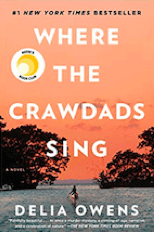

Whiskey When We’re Dry
John Larison
“If you got a ma looking out for you,
all you got to do is grow up.”
You could put this book into the category of well-written westerns. You could drop names like Louis L’Amour and Larry McMurtry. But then those dudes couldn’t have imagined a character like Jessilyn Harney. Whiskey When We’re Dry takes place in 1885, somewhere in the American West. After being orphaned, 17 year-old Jessilyn goes out alone in search of her brother, passing as a boy. What she faces is frightening, but don’t feel too sorry for her— In a gunfight, my money would be on Jessilyn. She is a badass, a survivor, and a realist. In fact, she just might be one of my favorite fictional characters.

“I’ve seen it happen over and over again: a black person gets killed just for being black, and all hell breaks loose. I’ve Tweeted RIP hashtags, reblogged pictures on Tumblr, and signed every petition out there. I always said that if I saw it happen to somebody, I would have the loudest voice, making sure the world knew what went down.
Now I am that person, and I’m too afraid to speak.”
This YA novel was recommended to me by my wise teenage daughter, Stella. She raved about it and begged me to read it. She wasn’t wrong. So much has happened over the past few years … the deaths of people like Trayvon Martin, Sandra Bland, and Michael Brown, and the birth of the Black Lives Matter movement have contributed to an awareness among white people that a) none of this violence is new, and b) it’s high time we reevaluated the systems that allow this kind of thing to happen in the first place. But sometimes the greatest teachers of such heady concepts come from following the story of one single human being—in this case, 17-year-old Starr Carter (another amazing teenage heroine). Entering Starr’s world, and seeing things from her perspective taught me a lot. What’s it like to go to a neighborhood party and have to hit the ground when the gun shots begin? What’s it like to be black and pulled over for a malfunctioning brake light? What’s it like to have one foot in the black community, and one foot in the white? I think this novel should be required reading for all of us, regardless of age, regardless of race.
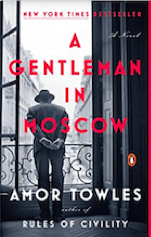
A Gentleman in Moscow
“’Perhaps it is a matter of celestial balance,’ he reflected. ‘A sort of cosmic equilibrium. Perhaps the aggregate experience of Time is a constant and thus for our children to establish such vivid impressions of this particular June, we must relinquish our claims upon it.’
The Witch Elm
“It’s taken me this long to start thinking about what luck can be, how smoothly and deliciously deceptive, how relentlessly twisted and knotted in on its own hidden places, and how lethal.”
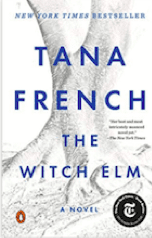
If you like well-written psychological/crime thrillers, Tana French needs to be on your radar. She’s a phenom in the UK and Ireland and is now becoming a bit of a thing here in the US. So far, I’ve read three of her novels (two of them appear on this list) but The Witch Elm is my favorite. It follows Toby Hennessey, a douchebag of the Irish variety (though he could easily be a Palo Alto, Manhattan, Boston, or Chicago douchebag … they seem strikingly similar). In other words, Toby is young, wealthy, attractive, and morally flexible. In the midst of living his best life, he is beaten nearly to death after interrupting a robbery at his posh digs. Toby’s life is turned upside down, and he finds himself enmeshed in a murder mystery that he seems unable to solve, either because his privilege and douchebaggery blind him to reality or because of his diminished intellectual capacities post beat-down. I was amazed by French’s ability to write the novel from Toby’s perspective, causing the reader to feel this strange pull of ambivalence: Toby is like that arrogant asshole you went to grammar school with, but whom you love like a brother because you’ve known each other for so long. We worry for Toby, but we are also incredibly annoyed by him. Or maybe that’s just me. One thing is clear: whether Toby is ready or not, shit is going down. The question is, will he figure it out in time to save his own skin?
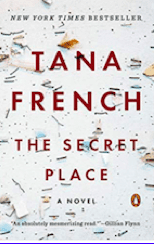
The Secret Place
“You forget what it was like. You’d swear on your life you never will, but year by year it falls away. How your temperature ran off the mercury, your heart galloped flat-out and never needed to rest, everything was pitched on the edge of shattering glass. How wanting something was like dying of thirst. How your skin was too fine to keep out any of the million things flooding by; every color boiled bright enough to scald you, any second of any day could send you soaring or rip you to bloody shreds.”
This is another Tana French novel I devoured, and it’s part of her Dublin Murder Squad Series*. In The Secret Place, two detectives investigate the murder of a teenage boy on the grounds of an all-girls private school. What I’ve come to understand (and love) about Tana French as a writer is that she is a Writer, not just a yarn spinner (knitter?). In other words: yes, she drives the hell out of a plot line and leaves you breathless (and often grossed out). But she also captures set and setting like a proper literary fiction writer would, and enlists the trees, the sky and the stars to add to the creepiness, or humanity, or magic of a given scene. The Secret Place does the impossible: it conveys the voltage and raw power of a teenage girl blessed with the support of true friends and she conveys the potentially lethal nature of teenage relationships. I couldn’t get enough of these girls. This school. This puzzle.
*Apparently, these novels are meant to be read in chronological order. I had no idea. Luckily, I had already read In the Woods, which is absolutely critical to understanding the climax in The Secret Place. So, if you choose to dive into The Secret Place, read In the Woodsfirst.
My Sister the Serial Killer
“I don’t know… it’s his words against yours.”
“Against ours, Korede. It’s his words against ours.”
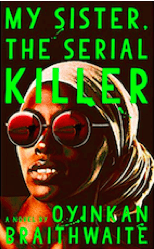
I love books that are difficult to categorize, and this one definitely qualifies. Is it a psychological thriller? Yep. Is it about the complicated relationships between siblings? Yes. Is it about how culture grooms women to behave in ways that aren’t in sync with their natural inclinations towards freedom, expression, and exploration? It sure is. Set in present-day Nigeria, this is a story of two sisters—one has a perfectly normal job as a nurse, and the other is a beautiful serial killer. While some sisters complain that borrowed outfits aren’t cleaned before they’re returned, this is a story about a different kind of mess. There’s one sister who, somehow, always ends up killing her man, and she always expects the other sister to clean it up. Literally. And though this may sound like a dark comedy, it’s not. Yes, there are some pretty funny lines, but My Sister the Serial Killer is serious business, and my heart was racing from start to finish. I can’t wait to see what Braithwaite does next.
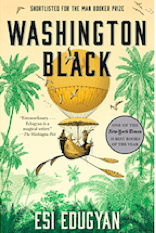
“I thought of my existence before Titch’s arrival, the brutal hours in the field under the crushing sun, the screams, the casual finality edging every slave’s life, as though each day could very easily be the last. And that, it seemed to me clearly, was the more obvious anguish- that life had never belonged to any of us, even when we’d sought to reclaim it by ending it.
We had been estranged from the potential of our own bodies, from the revelation of everything our minds and bodies could accomplish.”
Washington Black is the story of a young slave enduring life on a plantation in 1830s Barbados. I don’t want to ruin any of the magic or suspense of this book, but “Wash” befriends someone who changes the course of his life. And while you may not relate to Wash’s struggle—it is extreme to say the least—his soul struggle is universal: how do we make peace with the mysteries we can never solve? How far are we willing to go to find answers to questions we are entitled to ask, but that are impossible to answer? It’s no wonder this book was on the New York Times Book Review Top Ten Books of 2018, and it’s no wonder Barack Obama himself said it was one of his favorite reads of the year. Warning: The ending is something you will want to discuss with someone. Ambiguous and perfect (in my opinion).
The Silence of the Girls
“Great Achilles. Brilliant Achilles, shining Achilles, godlike Achilles … How the epithets pile up. We never called him any of those things; we called him ‘the butcher’.”
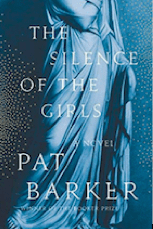
If you mourned the ending of Madeline Miller’s sensational novel Circe, you will delight in Pat Barker’s The Silence of the Girls. Your delight will not come from the plight of the women in this novel, because the word “grim” barely does justice to their reality. Your delight will come from yet another beautiful example of myth and history being reimagined and retold through the perspective of women. You won’t find worshipful accounts of Achilles and Agamemnon here. You will find the cold reality of what “spoils of war” actually meant: women sold into slavery and used up as the men saw fit. I know … not exactly uplifting reading. But riveting, un-put-downable reading. I devoured this book in two days.
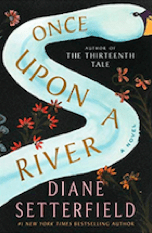
Once Upon a River
“Along the borders of this world lie others. There are places you can cross. This is one such place.”
I read this glorious, rich, magical book while I was in London visiting family. The timing was perfect, because this is a story that takes place in a village along the Thames in the 1800s. Imagine a stormy night, a cozy Inn, and a Hobbit-like vibe of villagers telling tall tales and drinking ale. Now imagine that the Inn’s heavy wooden door bursts open to reveal a horrifically injured stranger, somehow managing to carry a … what is it? A doll? A corpse? A child? The answer to that question becomes a riddle to solve (or a miracle to celebrate depending on your point of view) and everyone gets involved. This book has everything I love … mystery, a touch of romance, some truly bad bad guys and an eeriness that keeps you on edge.
Daisy Jones & the Six
“We love broken, beautiful people. And it doesn’t get much more obviously broken and more classically beautiful than Daisy Jones.”
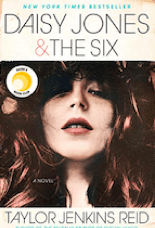
I was terribly skeptical about this one. A novel written to look like the transcript of a Behind the Music style rockumentary? Sounds lame. But I heard it was loosely based on (or inspired by) Fleetwood Mac, and more specifically, the days of the Rumours album. Given that a) I am a massive, incurable devotee of Stevie Nicks, and b) Rumours is one of the best rock albums of all time, I had to give it a go. Daisy Jones & the Six is excellent. There are love triangles, along with serious conversations about music and the value of rock and roll. There is addiction, sobriety, infidelity, fidelity, and you can almost hear the melodies floating off the pages. I’m in awe that not only can Taylor Jenkins write a great story, she can also write some pretty rad lyrics. I LOVE Taylor Jenkins Reid for having the balls to write something like this.
Non Fiction
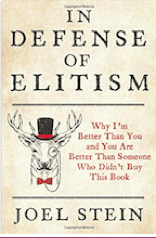
In Defense of Elitism
“We need to fix this while we still can, which is why I decided to become a full-time activist. Then I learned that being an activist pays even worse than being a writer. So instead I decided to find out who these people are who threw out the elite, what they want, and why—all of a sudden— they are so angry.”
Out of the many books I’ve read this year, only ONE had me literally LOLing to the point of tears. In fact, at one point, my son asked me if I was drunk. I wasn’t drunk. I was simply devouring Joel Stein’s latest book. I was lucky enough to interview him for my podcast and I loved every minute of our conversation. But don’t let the title of his book fool you—In Defense of Elitism is not parody or satire, it’s a whole-hearted, intellectually curious, clear-eyed exploration of why populism vs. elitism (or gut-instinct vs. expertise) has become the biggest philosophical cage-fight of our time. Joel Stein offers not only a well-vetted explanation of how we got ourselves here, but also puts forth ideas for righting the ship (a little less smugness with our intellectual elitism might go a long way). Amazingly, Joel manages to do all of this while also being incredibly funny.
Horror Stories: A Memoir
“Losing love can turn you into a ghost in your own life. You go to all the same places, do the same things, but you’re not really there. … You’re physically present, but emotionally, you’re in some parallel dimension from which you cannot escape, no matter how hard you try. Time will refasten what’s come unmoored inside you.”
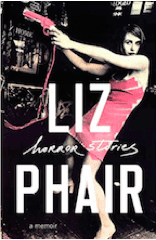
I saw Liz Phair about a year ago with my BFF Naomi at the Fillmore in San Francisco, and I scream-sang every word to almost everything she played, along with scores of other ladies of a certain age. But that’s the thing about Liz Phair: if you love her, you loooove her. Like, you’d take a bullet for her. So naturally, as a fan, I loved all of the juicy rock-star behind-the-scenes action, and her nuanced reaction and general take on #metoo. But what makes Horror Stories so damn good is that she writes the way a true friend would. A friend who’s dead honest about her faults, her regrets, her strengths and all of the micro-moments that made her the woman she is—for better or worse. And I am always here for that kind of conversation. Especially when that “friend” is Liz f*cking Phair (no one drops an f bomb better than she does).
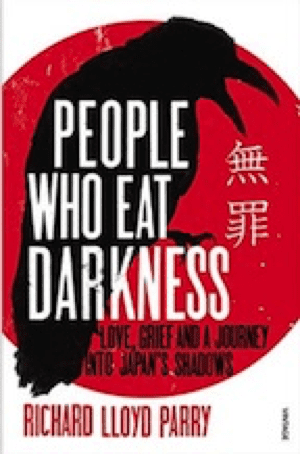
People Who Eat Darkness
Richard Lloyd Perry
(Note: this is the cover art for the UK edition of the book. I began reading it while in London, thanks to the recommendation of my cousin Jeffrey who shares my book obsession. The UK cover art was just so much cooler, I had to go with it. So don’t be confused when you see the U.S. cover art on Amazon. 🙂
Back in 2000, Lucie Blackman, a young British woman, disappeared in Tokyo and was never heard from again. People Who Eat Darkness is the phenomenal piece of investigative journalism that tracks the arc of Lucie’s mysterious disappearance and tragic end. What I found both heartbreaking and fascinating was how one woman’s economic choices (or her perception of a scarcity of economic choices) led to her traveling to Tokyo in the first place. It made me think about the connection between money, power, and misogyny, and how this story plays out all over the world every single day. But as much as People Who Eat Darkness may sound like your typical true crime, sweet-girl-meets-terrible-end trope, its twists and turns and commentary on the culture of Tokyo, the Japanese justice system, and workings of the police make this book one of the best I’ve read this year, and a fresh contribution to the genre. But be forewarned: It is dark. VERY dark.
Maybe You Should Talk to Someone
Lori Gottlieb
“In therapy we aim for self-compassion (Am I human?) versus self-esteem (a judgment: Am I good or bad?).”
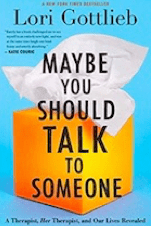
I am a huge proponent of therapy. In fact, I thank God every day for my therapist of many years. I doubt I would have had the courage to envision and build the beautiful life I have today if it weren’t for Dr. Jeb Berkeley. So when I heard there was a new memoir about therapy, written by a therapist who goes to therapy because of a major life change, I was IN. Lori Gottlieb pulls off something incredible here: she is relentlessly honest about her own neurosis, while also demonstrating what an amazingly gifted therapist she is. One of the terrible traps we fall into during therapy is that we lionize our therapists, imagining them to be Buddha-like, guiding us from the top of the mountain. We don’t like knowing that they are flawed, unsure, or afraid. But the truth is, good therapists are human and take us deeper into our own humanity. This book made me cry (that’s two this year!), and it made me feel a tremendous tenderness towards all human beings engaged in the great struggle that is everyday life.
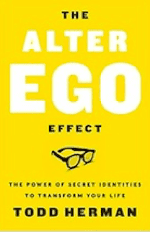
The Alter Ego Effect
I love it when I find a performance coach doing something unique to help clients achieve greatness. Todd Herman’s book The Alter Ego Effect codifies and explains a technique many of us have secretly used because it holds a secret kind of power: the use of an archetype, or as Herman calls it, an “alter ego.” It’s a technique I’ve used for myself and with clients, though I’ve always called it “borrowing energy.”
His term is far better, and his process is powerful and fun. When you reach the absolute limits of what you can do on your field of play, why not call in an alter ego who can become so much more than “you” can? Todd Herman’s process is fascinating, fun, and incredibly helpful when you’re swimming way out of your depth. Or as he says in the book,
“This isn’t being fake. Pretending to know about particle physics when you don’t is fake. Using an Alter Ego to entertain a group of physics students when you have been a boring physics professor until now is just using the right tools for the job.”
Digital Minimalism
I loved this book so much, I dedicated an entire podcast episode to it, so I’ll let that do the talking. Suffice it to say, this book has changed the way I live my life. If you’re feeling agitated, unsatisfied, and fried, it just might do the same for you.
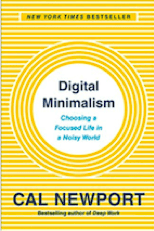
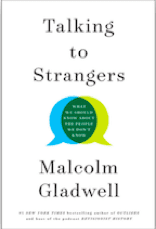
Talking to Strangers
“Today we are now thrown into contact all the time with people whose assumptions, perspectives, and backgrounds are different from our own. The modern world is not two brothers feuding for control of the Ottoman Empire.
It is Cortés and Montezuma struggling to understand each other through multiple layers of translators. Talking to Strangers is about why we are so bad at that act of translation.”
My people: I don’t know how to convey this with sufficient emphasis, so I’m just gonna come out and say it: READ THIS BOOK. Better yet, LISTEN TO THIS BOOK ON AUDIBLE. When I’m celebrating my 99th birthday, and someone says “Oh, ancient and wise Bronwyn, what books have changed you as a person?” I shall say, with my scratchy Kathleen Turner voice, “Talking with Strangers, my child.” This book will literally change the way you see yourself and others. I would say more, and get specific, but every sentence I write about his treatment and analysis of, say, the Brock Turner trial, the Sandra Bland tragedy, and even the Jerry Sandusky conviction seem too paltry to convey just how good this book is. Just do yourself a huge favor and download it. Did you do it? Go ahead. I’ll wait.
Becoming
I read Becoming at the tail end of last year, just days after I clicked “publish” on my Best of Reads of 2018 post, so it didn’t make the cut. But I’ve been saving it ever since. This book, like Talking with Strangers, is best consumed via Audible (or Libby, or your public library’s digital listening app).
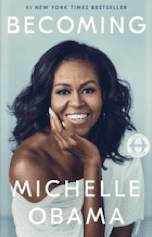
Michelle Obama’s voice is so rich, so warm … so familiar, that I mourned the loss of a good friend when it was over. I felt bereft without my dose of Michelle storytelling and wisdom. I’ve never read a first lady memoir before, but my expectations were low—not because of this first lady—but because of the “genre.” I figured it would be too sanitized. Too dull. Too “safe.” This memoir is none of those things. It’s the story of an African American woman growing up during a specific time and place in American history, and how she finds herself making history. It is written with humility, grace, humor, and authenticity, and I loved every word on every page. Especially the part where she meets Barack for the first time … spoiler alert … she was his superior at their law office in Chicago.
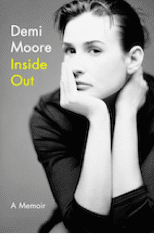
Inside Out
Demi Moore
“How does it feel to be whored by your mother for five hundred dollars? It feels like you are an orphan.”
What is it about the celebrities of the 1980s?? I loved Rob Lowe’s memoir Stories I only Tell My Friends, and I reeeeallly loved listening to Demi Moore’s memoir Inside Out.
Like Rob Lowe, Demi’s memoir is appealing because it’s actually good. I’m not gonna lie: I loved the behind-the-scenes stories of who loved whom, and who slept with whom. I also loved reading Demi’s truth—how Demi felt about herself. She was one of the biggest stars of her generation … beautiful, successful, smart, admired, and loved. On the inside, however, she was barely keeping it together. On the inside, she was constantly questioning whether she belonged at all. Sound familiar? Like Liz Phair’s memoir, Demi Moore tells us the truth about what it was like to live inside Demi Moore herself—not the Hollywood star we all projected onto her. Does she tell the whole truth? As my Gran used to say “Not bloody likely.” But what she does choose to reveal shows us the destructiveness of the film industry pre-#metoo, the agony of being the daughter of two people who shouldn’t be allowed to raise pigeons, let alone children. Inside Out feels like it could be any of us telling our story. With or without the private jets, the story of one woman’s journey (sometimes on hands and knees) out of addiction and trauma into the light of self-compassion and zero-fucks-given is a story worth hearing.
